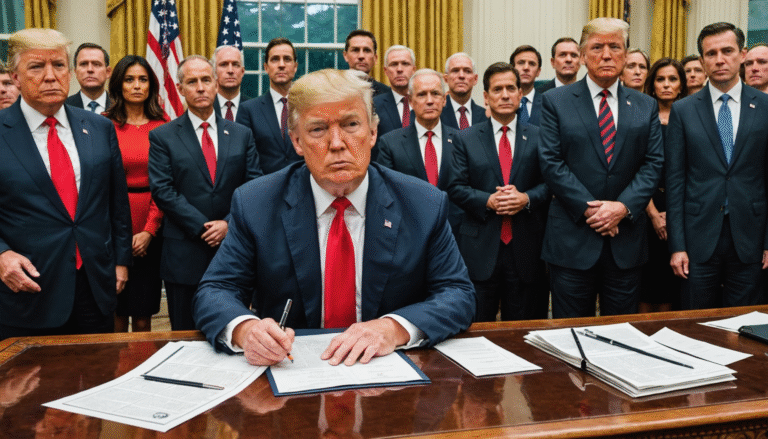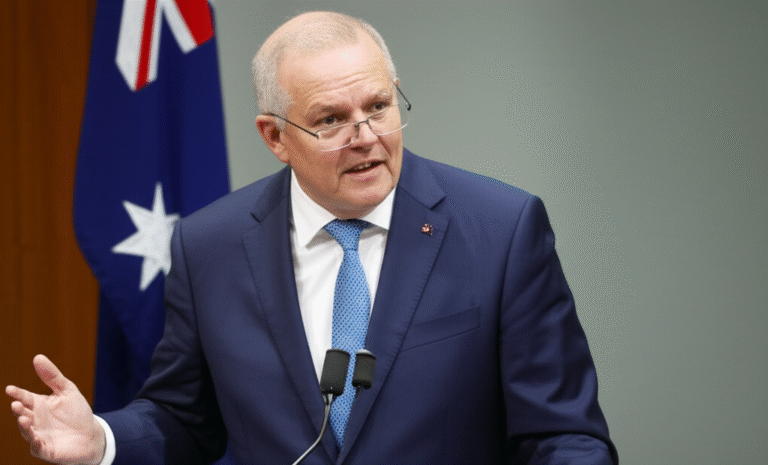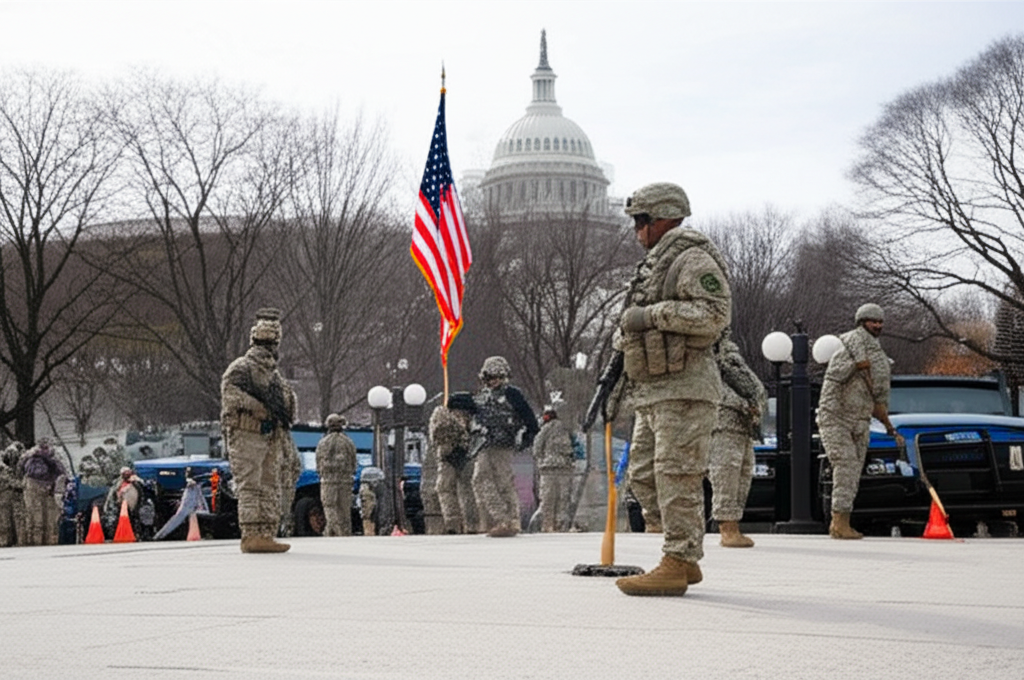
An unusual and contentious deployment of National Guard forces in Washington is undertaking a diverse range of duties, mixing traditional security responsibilities with extensive city cleanup tasks. This distinctive [Source] has transformed the role of military personnel in the US capital, presenting a model that authorities are considering replicating in other major urban centers across the country. The deployment has drawn attention for its broad scope, encompassing everything from responding to potential active shooter situations and breaking up altercations to removing trash and maintaining urban landscapes. This expanded mandate has led to significant discussion regarding the appropriate function of military forces in domestic civilian contexts, especially as police statistics indicated a decrease in violent offenses despite claims of rising crime.

Background of the Washington National Guard Deployment
President Donald Trump initiated the deployment of military forces in Washington a little over a month prior to the recent order for Memphis, Tennessee. This contentious decision was made to address what President Trump characterized as out-of-control crime, a claim that stood in contrast to police statistics indicating a decline in violent offenses within the city. The Washington attorney general’s office critically described this move as an “involuntary military occupation,” highlighting the controversy surrounding the involvement of military personnel in local law enforcement functions. This particular deployment offers an early look at how the National Guard might be utilized not only in Memphis, but also in other cities like Baltimore and Chicago, where President Trump has similarly threatened to dispatch troops.
Mark Cancian, a retired US Marine colonel and senior advisor at the Center for Strategic and International Studies, described this approach to crime fighting as “very unusual.” While National Guard members have historically been called upon for specific, short-term incidents, Cancian noted that this “longer-term policing function” diverges significantly from typical deployments. The current force in Washington consists of approximately 2,300 troops. Over half of these forces originate from eight Republican-led states, with the remaining personnel drawn from the city’s own National Guard. In parallel with the military presence, federal law enforcement personnel have also increased their visibility on Washington’s streets. Further escalating the situation, President Trump issued a threat overnight on a Monday to declare a national emergency and federalize the city, following Mayor Muriel Bowser’s announcement that local police would no longer assist with immigration enforcement.
Diverse Tasks of the National Guard in Washington
The Joint Task Force-DC (JTF-DC), to which the National Guard troops in the city are assigned, outlined the extensive array of responsibilities for the deployed forces. These tasks include ensuring monument security, conducting community safety patrols, safeguarding Federal facilities, managing traffic control posts, and contributing to area beautification efforts. A spokesperson for JTF-DC explicitly stated that “Guard members will provide a visible crime deterrent, not arrest, search, or conduct direct law enforcement actions.” This clarification underscores the supportive, non-direct enforcement role intended for the troops, emphasizing their function in enhancing public safety through presence rather than direct intervention in arrests.
The daily activities of the troops, as documented in JTF-DC statements, provide a clear snapshot of their diverse engagements. For instance, on September 12, Guard members responded to a potential active shooter scenario at a Metro station, promptly cordoning off the area to ensure public safety. Just five days prior, on September 7, they intervened to break up a physical altercation near another station. In late August, forces demonstrated their community safety role by identifying and tracking a suspected robber until local police could arrive and make an arrest. During the same period, they also provided protection to a family that was being harassed by an individual claiming to possess a weapon, illustrating the variety of security and protective duties undertaken by the deployed personnel.
Extensive City Cleanup and Beautification Projects
Beyond security functions, National Guard forces in Washington are also significantly involved in a range of projects aimed at city cleanup and beautification, aligning with another of President Trump’s stated objectives for the deployment. As of September 15, the scope of these efforts was substantial. Troops had successfully cleared an estimated 900 bags of trash from various locations across the city, contributing to a noticeable improvement in urban cleanliness. Additionally, they spread more than 700 cubic yards (approximately 535 cubic meters) of mulch, enhancing public green spaces and landscaping. The cleanup initiatives also included the removal of five truckloads of plant waste, further tidying city environs. A specific beautification task involved painting nearly 100 yards (around 90 meters) of fencing, demonstrating the commitment to improving the aesthetic appeal of public areas.
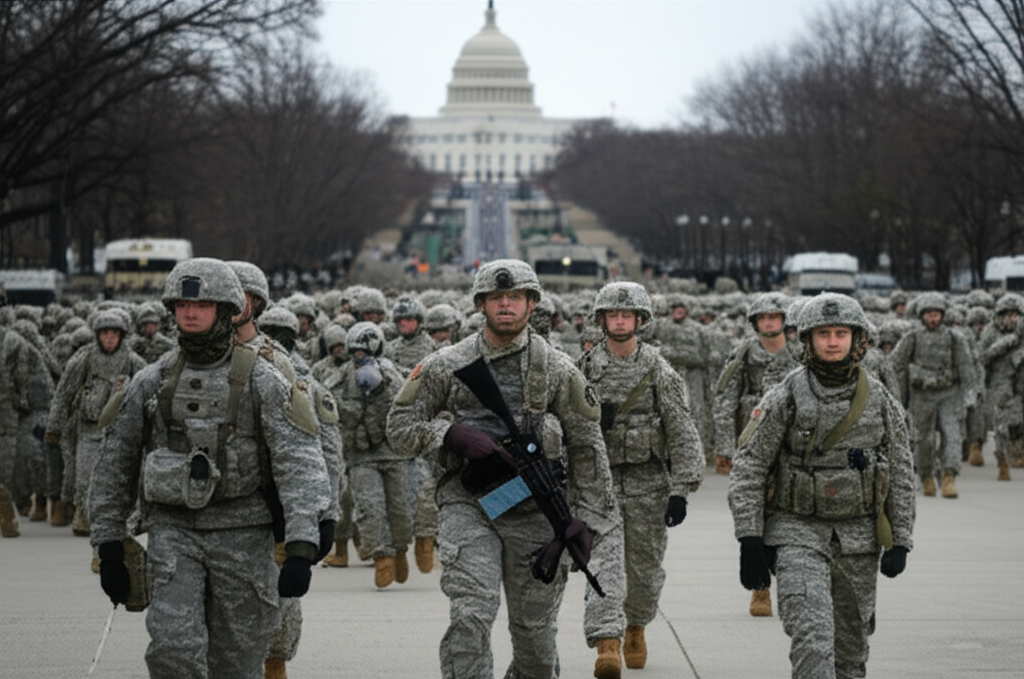
“If you want to do landscaping, hire a landscaping company,” Mark Cancian said, as they are “much, much better at it, and cheaper, faster.”
Mark Cancian acknowledged that while these beautification and cleanup tasks are not conventional duties for the National Guard, troops have historically been engaged in a wide array of non-traditional assignments. He cited examples such as distributing leaflets during the pandemic, shoveling snow, and even driving buses in various past deployments. However, Cancian critically remarked that for tasks like landscaping, it would be more efficient and cost-effective to “hire a landscaping company,” suggesting that such specialized civilian companies are “much, much better at it, and cheaper, faster.” This perspective raises questions about the allocation of military resources to duties that civilian services could perform more effectively.
Controversy and Internal Sentiment Regarding the Mission
The deployment in Washington has been notably controversial, a fact acknowledged even within the Joint Task Force-DC (JTF-DC). A document that was inadvertently sent to journalists highlighted this awareness, revealing internal assessments of media and online sentiment. This daily summary indicated that social media discussions from “self-identified veterans and active-duty commenters expressed shame and alarm” regarding the nature of the deployment. Furthermore, the document noted that “trending videos show residents reacting with alarm and indignation,” reflecting broader public discomfort with the military’s role in the capital.
The sentiment report also detailed “mentions of fatigue, confusion, and demoralization — ‘just gardening,’ unclear mission, wedge between citizens and the military.” These internal observations suggest a degree of disquiet among those involved and the public regarding the mission’s scope and purpose. Mark Cancian further elaborated on potential issues arising from the open-ended nature of the mission in Washington. He cautioned that “strain increases” as the deployment lengthens, particularly if “people don’t think that they’re doing something that’s particularly important.” This could ultimately lead to “pushback from the Guard saying, you know, either we get a real mission… which doesn’t seem to be there, or send us home,” indicating a potential challenge in sustaining the morale and commitment of the deployed forces over an extended, ambiguous period.
- Approximately 2,300 National Guard troops are currently deployed in Washington.
- Troops are tasked with monument security, community patrols, and traffic control.
- Cleanup efforts include clearing 900 bags of trash and spreading 700 cubic yards of mulch.
- Experts view this long-term policing and cleanup role as highly unusual for the Guard.
- Deployment has faced criticism as an “involuntary military occupation.”
What’s Next for National Guard Deployments
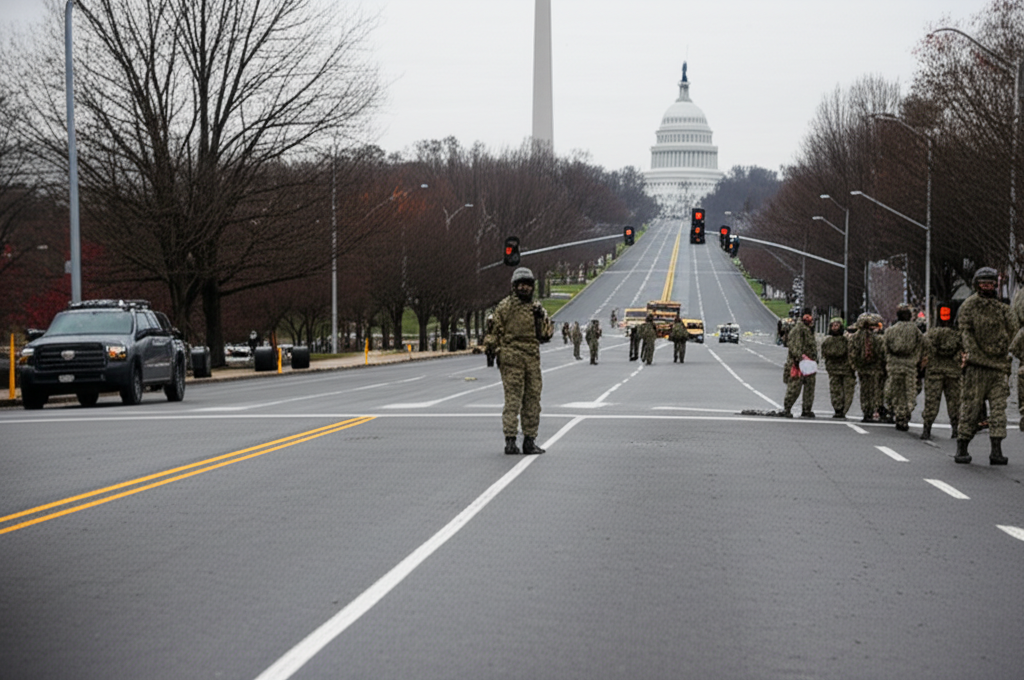
The extensive and unusual National Guard deployment in Washington serves as a potential blueprint for similar military assignments in other American cities. President Donald Trump, having signed an order, is already dispatching troops to Memphis, Tennessee, signaling a broader strategy to utilize military forces in civilian roles. This move suggests that the multifaceted deployment observed in the capital, encompassing both security enhancements and urban beautification projects, could become a replicated model. Beyond Memphis, cities such as Baltimore and Chicago have also been specifically mentioned by President Trump as potential locations for future troop deployments.
These prospective deployments indicate a continued shift in the perceived utility of the National Guard for addressing perceived urban challenges. The experience in Washington, characterized by its mix of security presence, incident response, and environmental maintenance tasks, is likely to inform future strategies. The discussions surrounding the appropriateness and effectiveness of such long-term military involvement, as highlighted by experts and public sentiment in Washington, will undoubtedly continue to be relevant as similar deployments are considered for other major metropolitan areas, shaping the future role of the National Guard in domestic operations.




